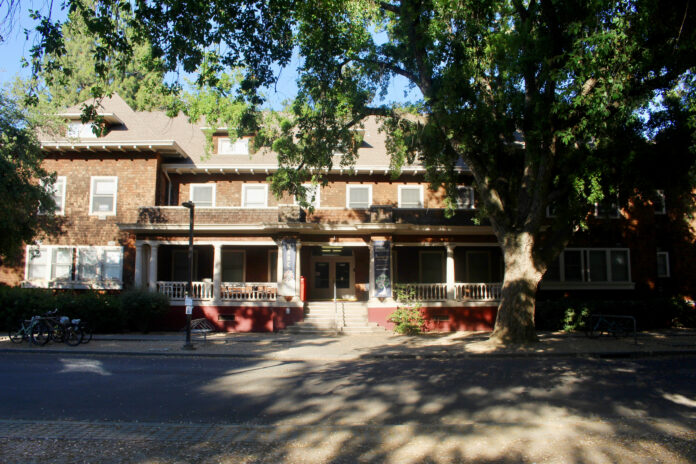The festival featured 24 short films centered around the theme of solidarity
By KAYA DO-KHANH — campus@theaggie.org
On May 18 and 19 from 6-10 p.m., a number of students and local community members gathered in the Student Community Center (SCC) multipurpose room to view a selection of 24 short films that were curated by eight undergraduate interns for the Davis Feminist Film Festival.
Put on by the UC Davis Women’s Resources and Research Center (WRRC), the theme for the 18th annual festival was “solidarity,” with sub-themes of survival, resistance, motherhood and intergenerational struggles. The event was free to all, and attendees enjoyed short films from around the world with snacks and drinks provided. The event also featured a photobooth and raffle prizes including gift bags filled with film posters, a t-shirt designed by one of the interns, a gift card to the CoHo and other goodies from the WRRC.
The annual grassroots event seeks to link art to social issues, as the festival screens independent films in the experimental, narrative and documentary genres that highlight perspectives that might be missing from more mainstream media. The festival accepts local, national and international submissions from professionals, students and community members, with the goal of creating a public space for filmmakers with marginalized racial and gender identities to showcase their art on the topic of social inequalities.
Third-year international relations major and Film Curation and Lineup Co-Chair Erika Au said that there were around 700 film submissions this year, which were narrowed down to a select 24 films by the interns. Each intern pair screened about three hours of films a week for a few months leading up to the festival.
“We didn’t think it was a good idea to ignore stories that were difficult to talk about, so we included those, but we also wanted some that brought light and hope into their stories,” third-year Asian American studies and cognitive science double major and Technology and Logistics Chair Mia Chi said. “We talked a lot about what feminism is when we were planning this festival […] thinking about all of those things and how [feminism] looks in different ways and in different places and circumstances.”
At the end of the festival, audiences voted on their favorite films for each day of the event. The audience’s award selection for day one of the festival was a film from Germany called “Matapacos,” by directors Karla Riebartsch and Lion Durst. “Matapacos” is based on the famous Chilean “riot dog” Negro Matapacos, a stray dog who gets to know Maria, a young protester. The audience’s favorite from day two of the festival was “El-Halabiyeh” by Palestinian director Rana Abushkhaidem. “El Halabiyeh” is personal film to Abushkhaidem, as it is a story about her grandmother the night before her heart surgery opening the doors to the memories of her life in Aleppo, Jaffa and Hebron.
“I worked on this film with all my heart,” Abushkhaidem said via email. “When I started submitting it to film festivals, I was somehow picky where to send it. I always tried to find something warm and familiar in each film festival I sent my film to. When I read about Davis Feminist Film Festival, I felt it.”
She said that having her film screened around the globe is a “pleaser,” and when she got the news that her film was chosen as one of the audience favorites, she was proud and happy. She said that she immediately called her grandmother to tell her the news.
“El-Halabiyeh fits into the theme of the feminist film festival because it tells the story of a woman who struggled and fought for her and her thirteen daughters’ lives in a complicated community and cruel political situation,” Abushkhaidem said.
On the first day of the festival, some people stumbled upon the festival while walking by the SCC, and ended up joining the event at the last minute. On the second day of the festival, several organizations that were in attendance, such as individuals associated with the WRRC and Students for Reproductive Justice, tabled at the event.
“I hope that audiences learn that there are so many different types of ways that feminism can be viewed in different cultural contexts,” third-year sociology major and Audience Engagement Chair Sara Tareen said. “Watching the films that I screened and then watching them again at the festival, I learned so much about so many different cultures and so many different types of people. When screening the films, that’s what I had in mind, I wanted the audience to be able to learn from these films […] It’s so important to learn other stories and other perspectives, and I feel like we did a really good job of doing that this year.”
Written by: Kaya Do-Khanh — campus@theaggie.org




